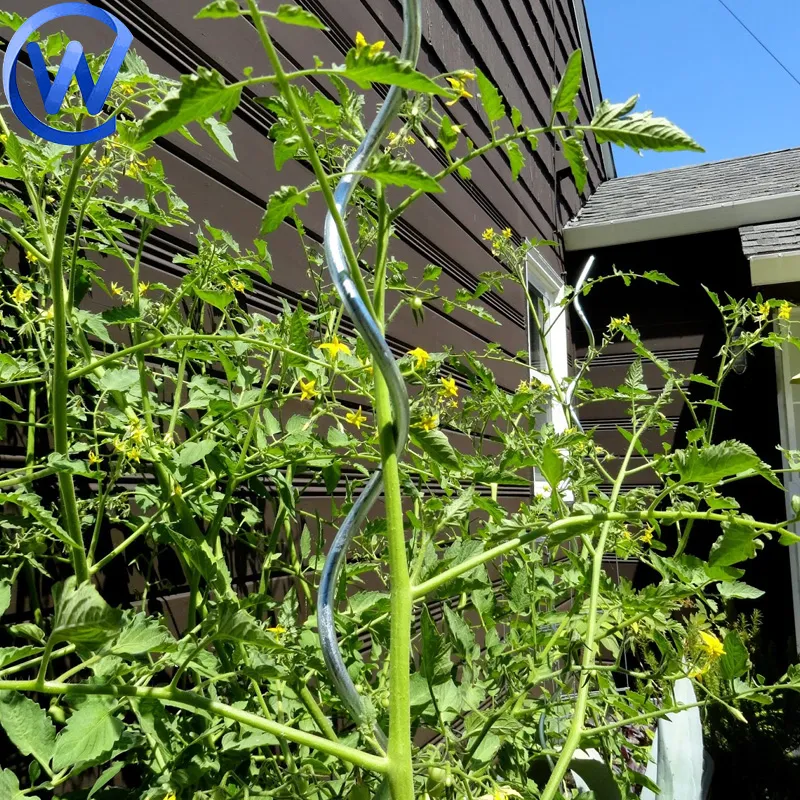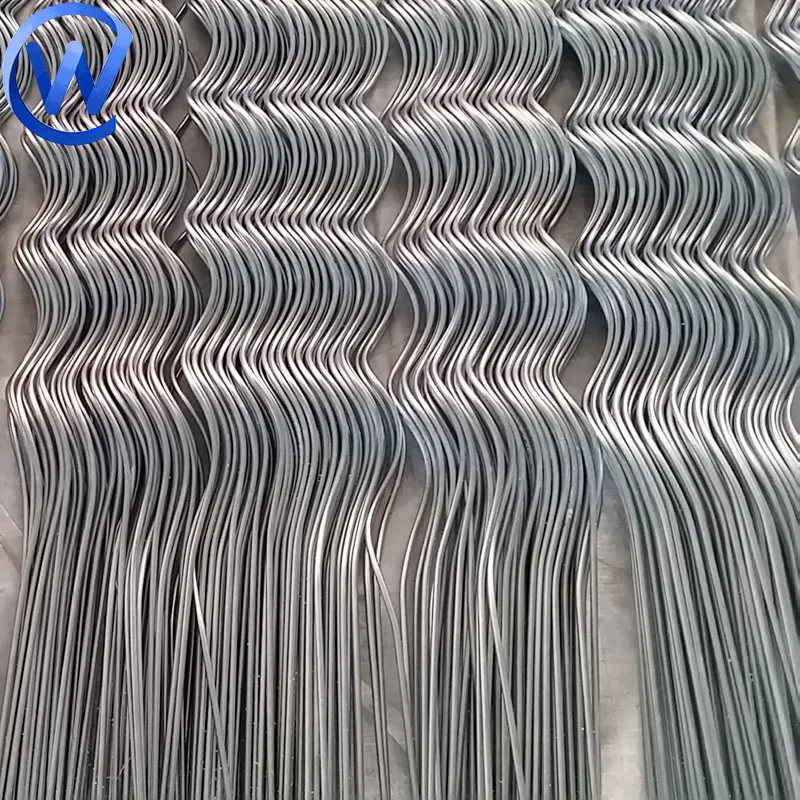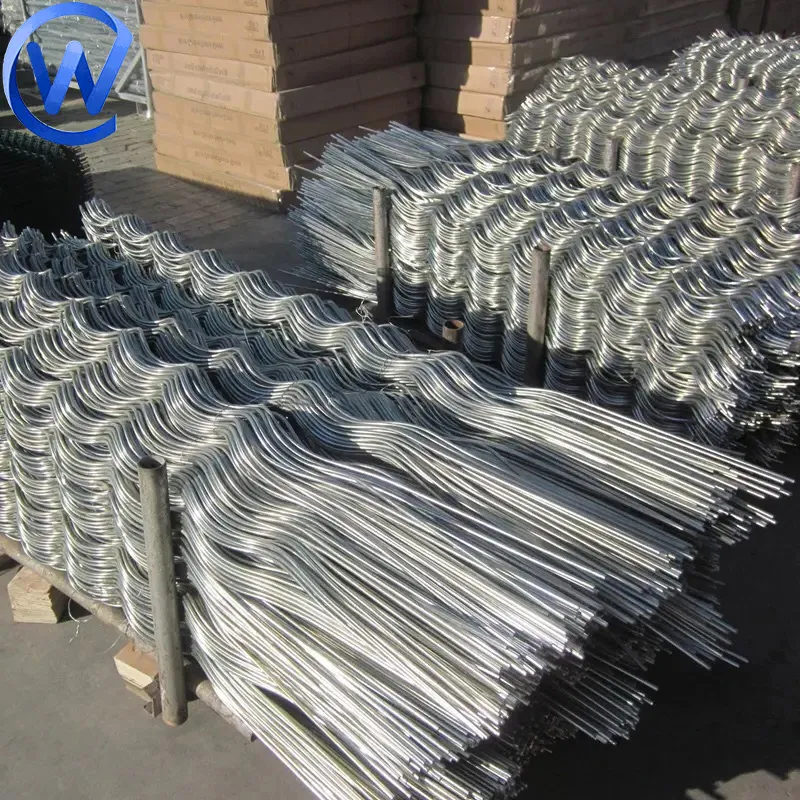-
+86 15030157877
-
sales@galvanizedmetalmesh.com
Sep . 02, 2025 02:00 Back to list
Spiral Plant Stick: Optimal Tomato Support & Vine Growth
Introduction to Advanced Plant Support Systems
In modern agriculture, efficient and durable plant support systems are paramount for maximizing yield, ensuring plant health, and optimizing cultivation space. The spiral plant stick represents a significant advancement in this domain, offering a robust, reusable, and highly effective solution for climbing plants, particularly popular in intensive horticulture. This specialized support system, often referred to as a spiral tomato plant support stake or tomato spiral stake, is engineered to provide continuous, gentle support, guiding plant growth upwards without the need for constant tying or re-tying, thereby reducing labor costs and minimizing plant stress.
Designed for durability and ease of use, these spiral supports are crucial for various applications, from commercial greenhouses and vertical farms to large-scale outdoor cultivation. Their inherent design allows for natural air circulation and sunlight exposure, critical factors for disease prevention and fruit ripening. This article delves into the technical aspects, manufacturing processes, application scenarios, and advantages of these innovative plant support solutions, targeting B2B decision-makers seeking to enhance agricultural productivity and operational efficiency.
Manufacturing Process of the Spiral Plant Stick
The production of a high-quality spiral plant stick is a meticulously controlled process, ensuring product integrity, optimal performance, and longevity. The emphasis is on material selection, precision engineering, and adherence to stringent quality standards to withstand harsh agricultural environments. Here’s a detailed breakdown of the typical manufacturing workflow:
1. Material Selection (High-Carbon Steel)
⚒
The process begins with the selection of high-quality, high-carbon steel wire rods. This material offers superior tensile strength and ductility, crucial for forming the spiral shape and ensuring the structural integrity required to support heavy plant loads. Common grades include Q195, Q235, or equivalent low-carbon steel for standard applications, or galvanized steel for enhanced corrosion resistance.
2. Wire Drawing & Sizing
✂
The selected steel rods undergo a cold drawing process, reducing their diameter to the precise specifications required for the spiral stakes. This not only achieves the desired thickness but also enhances the wire's tensile strength and surface finish, preparing it for the subsequent coiling phase.
3. Spiral Forming (CNC Machining)
⚙
Utilizing advanced CNC machining technology, the drawn wire is fed into specialized machinery that precisely coils it into the helical shape of the spiral tomato stakes. This process ensures consistent pitch, diameter, and overall length, critical for uniform plant support and ease of installation. The cold forming maintains the material's strength.
4. Surface Treatment (Galvanization)
⚖
To ensure superior corrosion resistance and extend service life, the formed spirals undergo hot-dip galvanization. This involves immersing the steel in molten zinc, creating a metallurgical bond that provides a protective coating against rust and environmental degradation. Alternatives include electro-galvanization for a smoother finish or PVC coating for specific aesthetic or chemical resistance requirements.
5. Quality Control & Testing
✅
Each batch undergoes rigorous quality control. This includes visual inspection for defects, dimensional checks (length, diameter, pitch), and mechanical property testing (tensile strength, yield strength) to ensure adherence to international standards such as ISO 9001. Salt spray tests are conducted to verify the galvanization's corrosion resistance, ensuring a projected service life of 10-15 years or more in typical outdoor conditions.
Target industries for these durable supports include commercial horticulture, market gardening, hydroponics, and even urban farming initiatives. The corrosion resistance of galvanized steel makes it ideal for humid greenhouse environments and varied outdoor climates. The ability of the spiral tomato support to promote vertical growth leads to energy saving through improved light penetration and more efficient use of growing space, directly translating to higher yields per square meter.

Industry Trends in Plant Support Systems
The agricultural sector is continuously evolving, driven by demands for increased efficiency, sustainability, and higher yields. Key trends influencing plant support systems include:
- Shift Towards Sustainable & Reusable Materials: There's a growing preference for durable, reusable materials like galvanized steel over single-use plastics or untreated wood, reducing waste and environmental impact. The long service life of a spiral plant stick aligns perfectly with this trend.
- Automation and Labor Reduction: Solutions that minimize manual intervention, such as self-climbing support systems like tomato spiral stakes, are gaining traction to combat rising labor costs and shortages.
- Vertical Farming & Controlled Environment Agriculture (CEA): The rise of CEA necessitates specialized, space-efficient support structures that integrate seamlessly with hydroponic or aeroponic systems, where uniform growth and precise control are critical.
- Data-Driven Cultivation: Integration of sensors and IoT devices sometimes requires support structures that are non-interfering and robust enough to carry additional components, though less direct for passive supports like the spiral plant stick.
- Durability and Longevity: Investments in agricultural infrastructure are increasingly focused on products with extended service lives, reducing replacement cycles and total cost of ownership.
These trends underscore the importance of robust, high-performance solutions like the spiral tomato support, which offer both economic and environmental benefits for modern growers.
Technical Specifications & Parameters
The performance and suitability of a spiral plant stick are defined by its core technical specifications. These parameters ensure optimal support, durability, and compatibility with various plant types and growing environments.
Typical Product Specifications (Galvanized Spiral Stake Wire)

Application Scenarios & Technical Advantages
Primary Application Scenarios
- Commercial Tomato Cultivation: Indeterminate tomato varieties require continuous support as they grow. Spiral tomato stakes provide an ideal solution, guiding the main stem and side shoots without pruning or tying, leading to higher fruit quality and easier harvesting.
- Cucumber and Bean Production: Similar to tomatoes, climbing cucumbers and pole beans benefit significantly from the vertical support offered by the spiral plant stick, allowing for optimal light exposure and air circulation, which are crucial for disease prevention.
- Greenhouse & Hydroponic Systems: In controlled environments, where space is at a premium and precise plant management is key, these supports integrate seamlessly, promoting vertical growth and maximizing crop density per square foot.
- Vine Crops & Small Fruits: Certain varieties of peppers, eggplants, and even some berries can utilize these spirals for organized growth, preventing fruit from touching the ground and reducing spoilage.
- Nursery & Landscaping: For guiding young trees or ornamental climbers, the spiral design offers aesthetic and functional advantages, ensuring robust structural development.
Technical Advantages
- Labor Cost Reduction: Eliminates the labor-intensive process of continually tying plants, offering substantial savings in large-scale operations.
- Optimal Plant Health: The open spiral design ensures excellent air circulation, reducing humidity around foliage and minimizing the risk of fungal diseases. It also allows uniform sunlight exposure to all parts of the plant.
- Enhanced Yield & Quality: By promoting vertical growth, plants can allocate more energy to fruit development, leading to larger, healthier, and higher-quality produce. Fruit is kept off the ground, reducing damage and rot.
- Superior Durability & Reusability: Hot-dip galvanized steel offers exceptional resistance to rust, pests, and UV degradation, ensuring a service life of over a decade. This reusability reduces long-term operational costs and environmental impact.
- Easy Installation & Storage: Simple to insert into the soil or growing medium. Their uniform shape allows for efficient stacking and storage during off-seasons.
- Versatility: Adaptable to various plant types and growing systems, including in-ground, raised beds, container111s, and hydroponic setups.
These advantages collectively contribute to a significantly improved return on investment for agricultural enterprises employing spiral tomato plant support stakes.

Vendor Comparison & Customized Solutions
Comparison with Alternative Plant Support Systems
While various plant support methods exist, the spiral plant stick offers distinct advantages, particularly for vine crops. Comparing it with common alternatives highlights its superior efficiency and long-term value.
Customized Solutions
Recognizing the diverse needs of modern agriculture, manufacturers offer highly customized solutions for their spiral plant stick products. This ensures that the supports are perfectly aligned with specific crop requirements, cultivation methods, and environmental conditions. Customization options typically include:
- Length and Diameter: Tailored to accommodate varying plant heights and stem thicknesses, from bushier varieties to very tall indeterminate vines.
- Spiral Pitch and Coil Diameter: Adjusted to suit the natural climbing habit of different species, ensuring optimal support and reducing the need for manual intervention.
- Material Grade and Surface Treatment: While hot-dip galvanization is standard, options for thicker zinc coatings, electro-galvanization for a smoother finish, or even PVC coating for specific chemical resistance or color requirements can be provided.
- Packaging and Logistics: Customized bundling, palletization, and shipping solutions to meet specific client receiving capabilities and reduce handling costs.
By offering these tailored solutions, manufacturers ensure that clients receive the most effective and cost-efficient support systems for their unique agricultural operations, reinforcing partnerships and long-term satisfaction.

Application Case Studies & Client Success
Real-world application demonstrates the tangible benefits of integrating galvanized spiral plant stick into commercial growing operations. Our commitment to quality and client satisfaction is reflected in sustained partnerships and demonstrable improvements in yield and operational efficiency.
Case Study 1: Large-Scale Tomato Farm (Mediterranean Region)
- Client Profile: A leading commercial tomato producer operating 50 hectares of indeterminate tomato varieties under open-field and protected cultivation.
- Challenge: High labor costs associated with traditional tying methods, inconsistent plant support leading to breakage, and increased disease pressure due to poor air circulation.
- Solution: Implementation of 2-meter tall, 6mm diameter hot-dip galvanized spiral tomato stakes across all cultivation areas.
- Results:
- Labor Savings: Reduced manual tying labor by approximately 40% per season.
- Yield Increase: 8-12% increase in marketable yield due to improved plant health, reduced fruit spoilage, and optimal light exposure.
- Disease Reduction: Noted a 15% decrease in common fungal diseases due to enhanced air circulation.
- ROI: Full return on investment within two growing seasons, with ongoing savings.
- Client Feedback: "The transition to spiral plant sticks was a game-changer. Our team spends less time tying, and our plants are healthier than ever. The durability means we won't need replacements for years."
Case Study 2: Hydroponic Greenhouse (Northern Europe)
- Client Profile: A high-tech hydroponic facility specializing in gourmet cucumbers and specialty peppers.
- Challenge: Traditional trellising methods were cumbersome, difficult to sterilize between cycles, and did not offer consistent support for rapid hydroponic growth.
- Solution: Installation of custom-length (1.8m), 5.5mm diameter galvanized tomato spiral support stakes, specifically designed for hydroponic troughs.
- Results:
- Operational Efficiency: Streamlined plant management, reducing daily intervention time by 25%.
- Sanitation: Easy to clean and sterilize between crop rotations, significantly reducing pathogen risk.
- Consistency: Achieved more uniform plant growth and fruit size, appealing to high-end markets.
- Client Feedback: "The clean, robust design of these tomato spiral stakes is perfect for our hydroponic setup. They're easy to manage, and the plants love them. A true asset to our high-density cultivation."
These case studies underscore the reliability and effectiveness of our specialized support solutions in diverse agricultural settings, contributing to improved profitability and sustainable growing practices.

Trustworthiness & Support
Frequently Asked Questions (FAQ)
-
Q: What plants are best suited for the spiral plant stick?
A: The spiral design is ideal for indeterminate (vining) plants that naturally twine or can be gently guided, such as tomatoes, cucumbers, pole beans, and some varieties of peppers and eggplants.
-
Q: How does the galvanized coating protect against rust?
A: Hot-dip galvanization creates a durable layer of zinc that metallurgically bonds to the steel. Zinc acts as a sacrificial anode, corroding before the steel, providing cathodic protection and a robust barrier against moisture and oxygen, extending the product's lifespan significantly.
-
Q: Are these spirals reusable for multiple seasons?
A: Absolutely. Our galvanized tomato spiral stakes are designed for multiple seasons of use. Their robust construction and corrosion-resistant coating allow them to withstand various weather conditions and be easily cleaned and stored for reuse, making them a sustainable investment.
-
Q: What are the typical lead times for bulk orders?
A: Lead times vary based on order volume and customization requirements. For standard orders (e.g., 20-foot container111 equivalent), typical lead times range from 3-5 weeks from order confirmation. Expedited options are available upon request and subject to production capacity.
Lead Time & Fulfillment
We maintain an efficient production and logistics network to ensure timely delivery for our B2B clients. Standard production lead times for galvanized spiral stakes are typically between 3 to 5 weeks for full container111 load (FCL) orders, varying based on material availability and customization specifications. For less-than-container111-load (LCL) or urgent requirements, please contact our sales team for tailored scheduling. We manage fulfillment globally, utilizing established shipping partnerships to ensure reliable and cost-effective delivery to your agricultural operation.
Warranty Commitments
We stand behind the quality and durability of our products. All spiral tomato stakes come with a standard 5-year limited warranty against manufacturing defects and premature corrosion under normal agricultural use. This warranty underscores our confidence in the materials and galvanization process, ensuring your investment is protected. Specific warranty details are provided with each quotation and order confirmation.
Customer Support & Technical Assistance
Our dedicated customer support team is available to assist with product inquiries, technical specifications, order tracking, and after-sales support. We provide comprehensive technical guidance on installation, maintenance, and optimal usage of our spiral plant sticks to ensure maximum benefit for your crops. Reach out via our website's contact form, email, or direct phone line during business hours for expert assistance.
Authoritative References
- ASTM International. (2020). ASTM A653/A653M - 20 Standard Specification for Steel Sheet, Zinc-Coated (Galvanized) or Zinc-Iron Alloy-Coated (Galvannealed) by the Hot-Dip Process. ASTM International.
- International Organization for Standardization. (2015). ISO 9001:2015 Quality management systems - Requirements. ISO.
- United States Department of Agriculture (USDA). (2023). Horticultural Crops Production. Retrieved from USDA National Agricultural Statistics Service (NASS).
- The American Galvanizers Association. (2022). Durability of Hot-Dip Galvanizing. Retrieved from galvanized.com.
- University of California Agriculture and Natural Resources. (2021). Tomato Production in California. Retrieved from anrcatalog.ucanr.edu.
-
Concertina Razor Wire: The Ultimate Guide to Secure, Practical Barrier Solutions
NewsNov.20,2025
-
Barbed Wire Fence: Durable Security Solutions for Global Agriculture and Industry
NewsNov.19,2025
-
Barbed Wire: Durable & Affordable Security Solutions for Global Applications
NewsNov.18,2025
-
Durable and Cost-Effective Fence Wire Mesh for Farm Sheep – Global Insights & Innovations
NewsNov.18,2025
-
Durable and Cost-Effective Farm Fencing Wire Galvanized | Global Use & Benefits
NewsNov.15,2025
-
Essential Guide to Wire for Fencing: Applications & Innovations
NewsNov.14,2025



